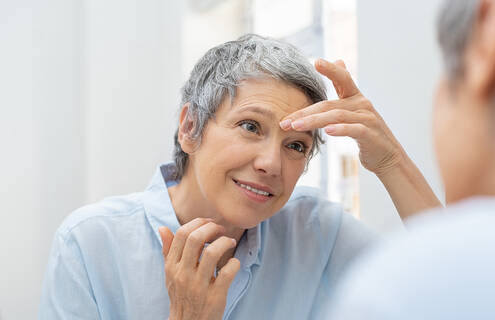
Dermatologist Roberta Lucas, MD, is concerned about what she is seeing on TikTok when it comes to sunscreen.
“The trend is to blame sunscreen use for skin cancer and to use sunlight with reckless abandon. This will have aging effects on your skin,” she says.
The belief that sunscreen is more harmful than beneficial is one of several popular misconceptions about how best to protect your skin, especially from aging. Lucas shares her thoughts on sunscreen and other skin creams that can minimize the effects of aging.
- Use sunscreen
There are no two ways about it. The sun ages skin. Also known as photoaging, sun damage occurs as a result of ultraviolet (UV) light on your skin. Sunblock can help mitigate its effects. But influencers trending on TikTok are advising to avoid using sunscreen because of toxic ingredients. Another popular claim is that sunblock protects only from UVA rays, not UVB rays.
The truth is that sunscreen and sunblock both can protect you from the sun. Sunscreen absorbs UV rays before they hit your skin, while sunblock prevents them from reaching you. (If you have sensitive skin, you may tolerate sunblock better than sunscreen. The American Academy of Dermatology does not advise use of one over the other and provides these tips on which sun protection creams to use, referring to them under the general term of sunscreen.).
Either way, sun exposure is the single biggest contributor to skin aging and Lucas says sun damage far outweighs any perceived risks of FDA-approved sunscreen or sunblock products, which have been shown to protect the skin. In addition to the potential of skin cancer, sun damage is the primary cause of wrinkles, poor skin texture, pigmentation, sun spots, and reduced skin elasticity.
“Sun exposure aligns with vanity when you are young but that will change at a certain, unpredictable point in your life and by the time you see the visible damage it is often extensive and difficult to reverse,” says Lucas.
“Sunscreen isn’t sexy, but neither is skin cancer or leathery skin and there is irrefutable evidence that this is the result of unprotected sun exposure,” she continues. “Sunscreen (and sunblock) options have improved and can even be flattering when tinted. Making a habit of putting sunscreen on every morning will pay off.”
- Pay attention to pH and other skin lotion ingredients
A healthy skin barrier is slightly acidic, but with age, the skin becomes less acidic, its barrier function declines, and it becomes more dry, sensitive, and moisturizer-dependent. Sun exposure worsens those effects. “Acidification of the skin can be an effective and economical way to preserve and care for it,” says Lucas.
Skincare products with a pH that is slightly more acidic than the average normal skin pH are beneficial. “Look for products with a pH of 4 or lower to help maintain your skin barrier. Not all products list pH, but some do.”
Also, introducing ingredients like alpha hydroxy acids (AHAs include glycolic acid, lactic acid, mandelic acid and more), beta hydroxy acids (salicylic acid) and polyhydroxy acids (for example, lactobionic acid and gluconolactone) can strengthen your skin barrier, reduce dryness and sensitivity, and decrease your need for thicker moisturizers.
“If a gently acidic product stings you may want to wash it off but don’t give up on it. Repeat and gradually increase the leave-on time until you tolerate regular applications,” she says.
- Cleanse away sebum
“There is a common misconception that sebum (produced from the body’s sebaceous glands) prevents aging and that oily skin won’t wrinkle. It’s not true,” says Lucas.
“Sebum has a pro-inflammatory effect, contributes to many skin diseases (facial dandruff, rosacea, acne, and more) and coarsens the skin. You do not need sebum to have that healthy skin barrier. In fact, children do not produce sebum yet they have very hydrated skin,” she says.
For that reason, too, Lucas recommends washing your face twice daily with a gently acidic skin cleanser (with salicylic or glycolic acid, for example). You can also tone your skin with a gently acidic toner to fully remove sebum and restore the slightly acidic pH. “Do that and watch your skin glow,” she says.
The American Academy of Dermatology agrees that the right anti-aging skin care products can help fight the effects of aging on your skin. They also stress that healthy skin care habits—such as eating healthy, getting enough sleep, and not smoking—are important for people in their 40s and 50s who want to look young.